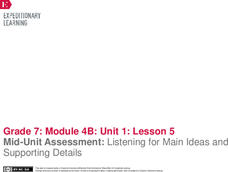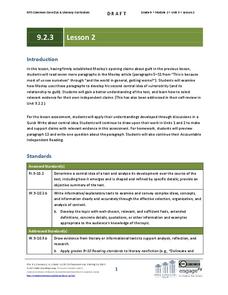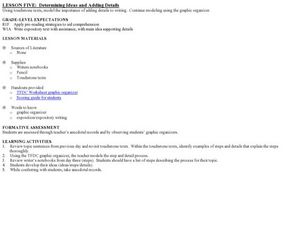Buck Institute for Education
Project Template for Letter to Parents
What better way to elicit the support of parents and guardians in project-based learning than with a letter directed to them that details the project, the activities involved, and suggestions for how they can support their learner. The...
Curated OER
States and Mates
Discuss and reflect on the concept of allies and alliances. The class examines the competition between the United States and Venezuela. Using the New York Times, they search for examples of geopolitical alliances. In addition, they write...
Curated OER
Four Tips for Effective Parent Communication
Team up with parents to understand and support your students with a united front.
EngageNY
Mid-Unit Assessment: Listening for Main Ideas and Supporting Details
Pay attention! Scholars view the video"Why College Students Should Start Paying Attention to Water" multiple times to complete a note catcher. After discussing their thoughts with the class, learners watch "The Water Crisis Isn’t...
Curated OER
Discussion Guide for The Catcher in the Rye
Is Holden Caulfield a trustworthy narrator? Groups work together to find evidence in The Catcher in the Rye to support a yes or no stance.
Polk Bros Foundation
Common Core Constructed Response Organizer
Get your writers ready to compose a constructed response essay in response to either an informational or fictional text. Pupils note down the big idea they wish to address as well as up to nine examples from the text that they wish to...
Polar Bears International
Taking Action!
Motivate young scientists to stand up and take action with this environmental science instructional activity. To begin, the class works in small groups brainstorming actions that support the conservation of the earth before creating and...
Making Evidence-Based Claims: Grade 7
The most effective way to support an argument is with clear and relevant evidence. As seventh graders read and listen to Cesar Chavez's California Commonwealth Club Address, they work through five sections of a textual analysis unit,...
NASA
Introduction: Building Claims from Evidence
Making a claim without supporting it has little value. Learners work on their claim-making skills in a well-designed lesson. They view still images from a video and make claims using support from the visual representations. They then...
C3 Teachers
African Americans and the Civil War: How Did African Americans Experience the Civil War?
To understand African Americans' involvement in the United States Civil War, high schoolers gather evidence from primary source images, census reports, and documents. As a summative performance task, individuals craft an argument,...
EngageNY
Grade 9 ELA Module 2, Unit 3, Lesson 2
"Everybody is guilty of something." As class members continue their close reading of Walter Mosley's essay, they examine how Mosley develops and supports his central ideas about Western civilization's relationship to guilt.
University of North Carolina
Statistics
Let's see you back it up! As shown in the 18th handout in the Writing the Paper series of 24 lessons from UNC, statistics help form an effective argument. The handout discusses how to analyze a source and break down the data to ensure it...
EngageNY
End of Unit 3 Assessment: Using Strong Evidence
Young poets view a model two-voice poem while discussing capitalization and punctuation. Pupils also complete an end-of-unit assessment about using strong evidence to support a literary analysis.
EngageNY
Research: Close Read of Text 2 for Each Expert Group
Pass the chalk! Pupils participate in a Chalk Talk activity to synthesize information from multiple texts about Roberto Clemente and Althea Gibson. Scholars also read an informational article about one of the athletes, searching for...
Anti-Defamation League
What Is the Dream Act and Who Are the Dreamers?
The DREAM Act (Development, Relief, and Education for Alien Minors Act) is the focus of a lesson that asks high schoolers to investigate the act's provisions and read statements by individuals who support and oppose the act. They then...
K20 LEARN
Writing Is Elementary, My Dear Watson: Writing Paragraphs With Evidence And Reasoning
Did Smitty do it, or is he a victim? Sleuths apply their observation and reasoning skills to build a case for an argumentative paragraph. Class members closely observe a cartoon, make a claim, cite evidence from the image, and support...
Curated OER
Elaborating the Main Idea, Using Supporting Details
A desk is used as a visual analogy to construct the main idea and supporting details in a story. The top of the desk is the main idea, and each of the four legs provides supporting details. The legs of the desk provide support for the...
Curated OER
Main Idea and Supporting Details on Pitcher Plants
Third graders read, Fly Traps! Plants that Bite Back. They locate the main idea and supporting details in the pitcher plants section. Then after they have located the information as individuals have them write it down in their reader's...
DePaul University
The Football Team
Playing team sports is about more than just scoring the most goals or winning the most games. Read this passage with your class and learn how athletes build character as members of a team. When finished, individuals identify the main...
Curated OER
Animals in the Media
Sure to activate young minds, this resource asks learners to consider how media influences their personal points of view. Pupils examine how animals are portrayed in the media to understand why they feel the way they do about those...
Curated OER
Shorten the Length
Learn how to summarize by identifying main ideas and supporting details. Readers cross out unimportant information as they read through a text. Is it a random detail? Cross it out! They then draw a concept map, placing the main idea in...
Curated OER
Use Details from Text to Identify Cause and Effect, Draw Conclusions, Compare and Contrast
Third graders discuss research topics and write a paragraph on one of the provided questions. They focus on including key words from charts that the class has been compiling. They underline supporting details within the text they write....
Curated OER
Determining Ideas and Adding Details
A handy TFDC (topic/fact/detail/conclusion) graphic organizer (included) allows young writers to outline and record their main ideas and supporting details in the prewriting phase. They then continue to add details to the topic sentences...
Curated OER
Comprehension: Identify the Main Idea from Text
Children in first grade listen and read along with the teacher to practice main idea identification. They use the provided reading passages to read, locate the main idea and supporting details. This is a fully scripted lesson which means...
Other popular searches
- Main Idea Supporting Details
- Supporting Details
- Main Idea & Supporting Details
- Identifying Supporting Details
- Supporting Evidence
- Peer Support
- Life Support
- Finding Supporting Details
- Family Support Systems
- Writing Supporting Details
- Positive Behavior Support
- Proposition and Support

























